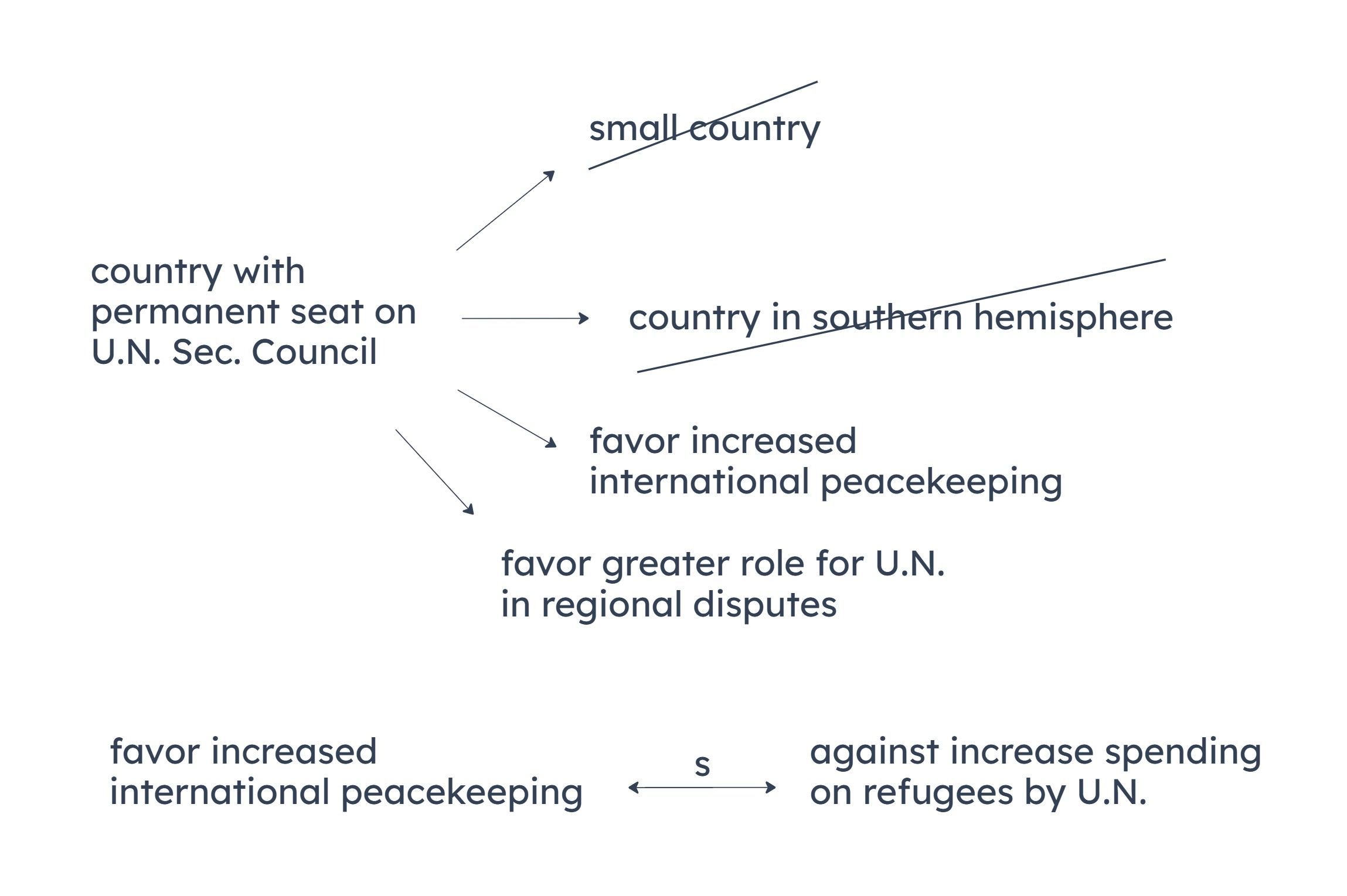Sign up to star your favorites LSAT 43 - Section 2 - Question 17
July 30, 2013Sign up to star your favorites LSAT 116 - Section 2 - Question 17
July 30, 2013
Some countries in favor of increased international peacekeeping efforts are not small countries.
Some countries in favor of a greater role for the United Nations in regional disputes are not small countries.
A
Some small countries do not want the United Nations to increase its spending on refugees.
B
Some countries in the southern hemisphere are not in favor of increased international peacekeeping efforts.
C
Some countries that have permanent seats on the United Nations Security Council are against increased spending on refugees by the United Nations.
D
Some small countries are in favor of a greater role for the United Nations in moderating regional disputes.
E
Some countries that are in favor of a greater role for the United Nations in moderating regional disputes are not located in the southern hemisphere.
Sign up to star your favorites LSAT 28 - Section 1 - Question 17
April 19, 2013Sign up to star your favorites LSAT 106 - Section 1 - Question 17
April 19, 2013
A
When large shopping malls are new they attract a lot of shoppers but once the novelty has worn off they usually attract fewer shoppers than does the traditional downtown shopping district.
B
Most of the money spent in a large shopping mall is spent by tourists who are drawn specifically by the mall and who would not have visited the community had that mall not been built.
C
Most of the jobs created by large shopping malls are filled by people who recently moved to the community and who would not have moved had there been no job offer in the community.
D
Most of the money spent in a large shopping mall is money that would have been spent elsewhere in the same community had that mall not been built.
E
Most of the jobs created by the construction of a large shopping mall are temporary, and most of the permanent jobs created are low paying.
Sign up to star your favorites LSAT 39 - Section 2 - Question 17
March 28, 2013Sign up to star your favorites LSAT 115 - Section 2 - Question 17
March 28, 2013Sign up to star your favorites LSAT 39 - Section 4 - Question 17
March 26, 2013Sign up to star your favorites LSAT 115 - Section 4 - Question 17
March 26, 2013
A
Human intervention in natural processes tends to reduce the biological diversity of ecosystems.
B
Protection of forests and their ecosystems is the only legitimate reason for attempting to prevent or control forest fires.
C
Forest fires begun by careless campers should be the target of human fire control efforts.
D
Humans tend to view forests as well as other ecosystems as instruments for the satisfaction of human needs.
E
If the health of an ecosystem is threatened by insects or other predators, human beings should not intervene to block that threat.
Sign up to star your favorites LSAT 37 - Section 4 - Question 17
March 16, 2013Sign up to star your favorites LSAT 113 - Section 4 - Question 17
March 16, 2013A year ago the government reduced the highway speed limit, and in the year since, there have been significantly fewer highway fatalities than there were in the previous year. Therefore, speed limit reduction can reduce traffic fatalities.
Summarize Argument: Phenomenon-Hypothesis
The author concludes that a speed limit reduction can reduce traffic fatalities. This is based on the fact that a year ago, the government reduced the highway speed limit, and in the year since that reduction, there have been fewer highway deaths than there were in the previous year.
Identify and Describe Flaw
The author assumes that the reduction in highway speed limit caused the decrease in highway fatalities. This overlooks the possibility that there are other explanations for the decrease in highway fatalities in the year following the speed limit reduction.
A
highway traffic has not increased over the past year
The negation of (A) doesn’t undermine the argument. If traffic has increased over the past year, that might strengthen the argument, because we’d expect to see more fatalities. Since the negation doesn’t hurt the argument, the author doesn’t have to assume (A).
B
the majority of drivers obeyed the new speed limit
The author doesn’t have to assume that most drivers obeyed the speed limit, because a speed limit reduction can still affect driving behavior even if most people don’t follow the speed limit. For example, the new limit can cause people to drive slower.
C
there is a relation between driving speed and the number of automobile accidents
The author’s conclusion concerns the number of highway deaths. This doesn’t commit the author to any belief about the number of accidents, which is different from the number of deaths.
D
the new speed limit was more strictly enforced than the old
If anything, the author assumes that the new speed limit was not more strictly enforced. More strict enforcement could have been an alternate explanation for the decline in fatalities. So the author assumes this didn’t happen, not that it did happen.
E
the number of traffic fatalities the year before the new speed limit was introduced was not abnormally high
This must be assumed because if the number of fatalities the year before the new limit was abnormally high, then that suggests the decrease in fatalities after the speed limit might just be a coincidence. It might be a return to the normal fatality rate.